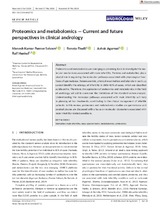| dc.contributor.author | Henkel, R | |
| dc.contributor.author | Panner, Selvam M.K | |
| dc.contributor.author | Finelli, R | |
| dc.date.accessioned | 2021-05-11T11:53:05Z | |
| dc.date.available | 2021-05-11T11:53:05Z | |
| dc.date.issued | 2021 | |
| dc.identifier.citation | Henkel, R. et al. (2021). Proteomics and metabolomics — Current and future perspectives in clinical andrology. Andrologia, 53(2),e13711 | en_US |
| dc.identifier.issn | 0303-4569 | |
| dc.identifier.uri | 10.1111/and.13711 | |
| dc.identifier.uri | http://hdl.handle.net/10566/6138 | |
| dc.description.abstract | Proteomics and metabolomics are emerging as promising tools to investigate the molecular mechanisms associated with male infertility. Proteins and metabolites play a pivotal role in regulating the molecular pathways associated with physiological functions of spermatozoa. Semen analysis, physical examination and laboratory work up cannot identify the etiology of infertility in 30%-40% of cases, which are classified as idiopathic. Therefore, the application of proteomics and metabolomics in the field of andrology will aid to overcome the limitations of the standard semen analysis. Understanding the molecular pathways associated with male infertility will help in planning ad hoc treatments, contributing to the clinical management of infertile patients. In this review, proteomics and metabolomics studies on spermatozoa and seminal plasma are discussed with a focus on molecular biomarkers associated with male infertility-related conditions. | en_US |
| dc.language.iso | en | en_US |
| dc.publisher | Blackwell Publishing Ltd | en_US |
| dc.subject | Biomarkers | en_US |
| dc.subject | Male infertility | en_US |
| dc.subject | Mass spectrometry | en_US |
| dc.subject | Metabolomics | en_US |
| dc.subject | Proteomics | en_US |
| dc.title | Proteomics and metabolomics — Current and future perspectives in clinical andrology | en_US |
| dc.type | Article | en_US |

